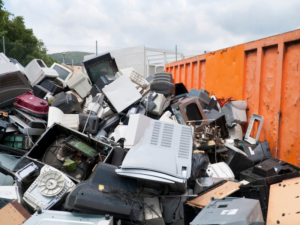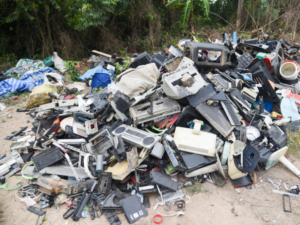These days, it’s hard to imagine a world without electronics. In our digital age, we rely on electronic devices for everything from cooking our food to brushing our teeth, not to mention the vast entertainment sector.
However, the convenience of these devices comes with a hidden cost: electronics waste. Newtech Recycling is at the forefront of addressing the e-waste challenge, emphasizing the importance of education and awareness. We believe that as more people understand the global implications of electronic waste, we can collaboratively work towards responsible disposal and e-waste management solutions.
Defining E-Waste: The Hidden Cost of Our Digital Age
Ever wonder what to do with old cables? What about your mobile phones that become obsolete when you get the new version? Your old circuit boards certainly aren’t doing anyone any good, so what now?
These items exemplify e-waste, which encompasses any electronic product that’s no longer in use, either due to technological advancements or malfunction.
While it’s natural for devices to outlive their utility, the disposal of old electronics presents a pressing dilemma. The challenge isn’t only about discarding unwanted items; it’s also about understanding the environmental and health risks associated with improper e-waste management.
If you’re still learning about e-waste, you’ve come to the right place. We have a few quick facts for you that can help you understand and contribute to a bigger solution.
1. Many Electronics Contain Toxic Materials
Many of today’s electronics, which have become integral to our daily lives, contain hazardous substances. Materials such as cadmium, lead, mercury, and beryllium are commonly found in these devices. When e-waste piles up in landfills, these toxic elements can break down and seep into the environment, known as leaching.
2. Leaching Can Poison Water
You’ve probably never even considered the effects of e-waste on water – that’s okay; not many people have. When leaching happens under landfills with e-waste, the toxic waste materials that build up can leak into the water found underground.
3. Recycling Saves Energy
According to USInsuranceAgents Sustainability Expert Imani Francies, “The energy saved by recycling e-waste is enough to power thousands of households for an entire year. While most people think of recycling as a time and energy-intensive process, it can really save both energy and time.”
Did you know recycling one million laptops saves enough energy to power 3,600 homes annually? That statistic may sound unbelievable, but it’s true. Simply by recycling electronics, not only can we minimize e-waste, but we can save energy and minimize costs.
4. E-Waste Ends Up in Other Countries
When cellphones and stereos go to die, they aren’t recycled like we would all prefer. Instead, they go into landfills – that much we already know.
It’s a common misconception that our discarded electronics remain within our borders. In reality, a significant portion ends up in landfills located in Asia and Africa. This international e-waste disposal pattern underscores the global nature of the problem and highlights the shared responsibility we have in addressing it.
5. Tons of E-Waste Is Thrown Out Each Year
Eoin Piggott from Wisetek provides a sobering perspective on the sheer volume of e-waste generated: “The amount of e-waste in the world is growing at an alarming rate. According to a report published by the United Nations, only 17.4% of e-waste created in 2019 was actually recycled, with the United States creating 6.92 million tons of e-waste in the same year.”
These figures emphasize the critical need for robust e-waste management and recycling initiatives.
6. A Very Small Amount of E-Waste is Currently Recycled
Despite growing awareness, current recycling rates for e-waste remain alarmingly low. Only about 12.5% of all e-waste is currently being recycled, leaving the vast majority to accumulate in landfills. Some electronics are burned and melted down in incinerators, but this method also releases toxins into the air.
7. E-Waste Makes Up Most Toxic Waste
One of the most startling revelations about e-waste is its dominance in the toxic waste category. E-waste accounts for an estimated 70% of all toxic waste worldwide. This fact underscores the pressing need to address the environmental and health hazards posed by the improper disposal of electronics.
8. E-Waste is Contributing to the Rapid Price Rise in Metals
As electronic devices become obsolete, they are often discarded without a second thought. However, these devices often contain precious metals. When we irresponsible discard of these products, we inadvertently lead to a rise in the cost of these metals.
For perspective, a staggering amount of these metals, equivalent to that found in several ore mines, can be reclaimed from just a million discarded cell phones. For every one million cell phones thrown out, there are about 250 kg of silver, 24 kg of gold, and 9 tons of copper that could have been recovered.
9. E-Waste Is Worth Billions
The global e-waste scenario is both an environmental concern and an economic one. Experts estimate that the combined value of discarded electronics is worth at least $62.5 billion, surpassing the GDP of many nations.
10. E-Waste Is Expected to Double
According to the World Economic Forum, e-waste is expected to double and will continue to grow exponentially if nothing is done to mitigate the issue. That is, if nothing changes in the way we dispose of electronic waste, it will simply continue to pile up and poison the world around us.
Tucker Anderson, Founder and Owner of Black Diamond Junk Removal, says, “The amount of e-waste that is created globally is expected to double between 2014 and 2030.”
11. All Electronics Are Recyclable
Austin Dowse, CEO at Aimvein, brings attention to a crucial aspect of e-waste: “In the United States, over 70% of people throw away their cell phones immediately after buying a new one even though they could be repaired. Whereas only 20 percent of that material was recycled or composted.”
Almost every form of electronics has at least one recyclable, salvageable part. Even server equipment recycling is vital. Most electronics include materials like glass, metals, and plastic – all of which we can collect and repurpose. In truth, there are far too many electronics being thrown away that still have value to them.
Take Action with Newtech Recycling
The facts about e-waste paint a clear picture: the challenge is immense, but so is the opportunity. Every discarded device offers a chance to make a positive environmental impact, conserve valuable resources, and drive sustainable change. Electronic devices are more ubiquitous today than ever before, both in the workplace and at home. Cell phones, computers, cords and cables, copy, fax, and print machines, the list goes on and on; which of these devices will eventually need to be recycled? The answer, for anyone who cares about the environment, the economy, or human health, is “all of them.”
That’s a lot of work. Newtech Recycling exists to make the process easier for everyone. Let’s work together to strive for a better future. Contact Newtech Recycling today.



